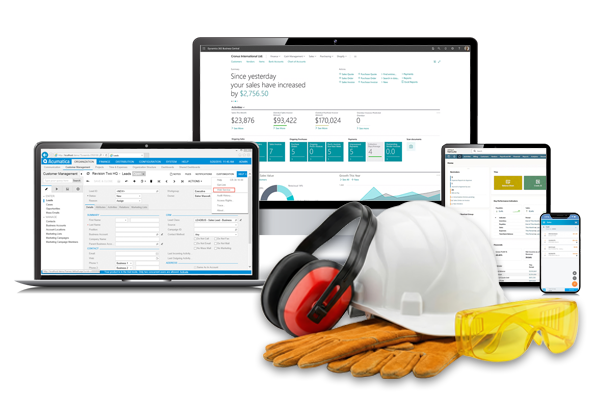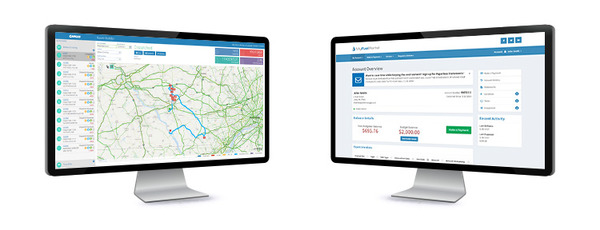ARTICLE | 6 MIN READ
On-Premise vs. Cloud Distribution Software
How you deploy your distribution software will affect how your company runs.

When evaluating new software, distribution companies often weigh the benefits of deploying software on-premise versus in the cloud. On-premise software is housed on servers at your distribution center or office; no internet connection is needed to access their data. Cloud software houses data on remote servers, and that information can be accessed via a web browser from any device with an internet connection.
You may be wondering whether on-premise or cloud distribution software is the right fit for your business. To verify the best solution for your company, consider the four following factors.
Compliance
Businesses in highly regulated industries such as healthcare, education, and distribution must consider compliance management when evaluating current and future software investments. On-premise systems have adapted to compliance mandates, and their architecture lends itself to a more compliant workplace.
Legacy software that requires data imports and manual entry encourages users to confirm information before entering it into the system, creating another layer of compliance protection. In addition, fewer access points and more rigid software structures make it more challenging to go against the grain of your system and its compliance management tools.
To maintain a compliant on-premise system, you have to keep it current with the latest updates. This may not seem too challenging, but consider the time and labor cost of these on-premise updates. Does the benefit of on-premise software outweigh the effort required to maintain compliance?
With cloud software, change happens almost instantly. By nature, cloud solutions prioritize fast, accurate information. And while your team stays in complete control of data, they are no longer responsible for evaluating compliance. The onus falls on your cloud software provider to remain up to code on specific regulations and ensure that your system is accurate and compliant.
You can stress less with the right software provider and dedicate more time to creating value for your company. Plus, updates push out automatically and at no cost to your business. Cloud software is better equipped than on-premise software to keep up with changing compliance requirements without breaking the bank.
Cost
The price tag is one of the first things businesses check when evaluating new software. However, the sticker price can be deceptive. You’ll have to compare more than just the implementation cost to your budget. Other expenses you’ll contend with include:
- Maintenance fees
- Add-ons and customizations
- Support packages
- Additional users
- Back-up costs
- Additional training
If your distribution company already uses on-premise software, you’ve likely built these expenses into your budget. Of course, prices can fluctuate, and an increase in any one of these costs can put added pressure on your business.
Cloud distribution software eliminates hardware costs, as your provider is responsible for maintenance and updates rather than your team. And with the right software implementation partner, you can benefit from discounted support and training. Typically, cloud software users only pay for the resources they consume, not the bells and whistles they don’t.
Due to decentralized ownership and a lack of maintenance costs, cloud solutions use software-as-a-service (SaaS) models for payment. Your team is paying to have your data hosted off-premise rather than paying for servers that are stored on-site. This means you’re paying for a service rather than a product. This also makes it easier and more cost-effective to scale and add functionality and features.
Control
Data privacy and security are significant concerns for the distribution industry. It makes sense that distributors are drawn to on-premise software, giving their teams full control of data and systems. Similarly, distributors might hesitate to embrace cloud software due to a perceived lack of software and data ownership.
So, who “owns” the cloud? Unfortunately, this isn’t an easy question to answer. Whereas on-premise servers exist as individual and independent entities, the cloud is an umbrella that encompasses all the servers under it. While companies that use cloud software own the data stored on it, they do not own the cloud.
If this sounds like a cause for security concerns, don’t worry—cloud software is just as secure as on-premise software. Data and encryption keys are available through cloud providers, ensuring proper steps are taken to protect your business and customer information. Plus, cloud providers have many more resources than the average business to monitor, prevent, and respond to breaches.
Deployment
The deployment method you choose for your distribution software impacts data accessibility. On-premise software requires users to be on-site and even on specific devices if they want to access business information. While this might be fine for a single-location distributor, multi-location distribution companies may find they lack a complete view of their business.
Cloud software provides the freedom and flexibility to access systems wherever you are, whether that’s a warehouse, your office, your home, or even halfway around the globe. These solutions can pull data from all your warehouses and distribution centers to provide a snapshot of where your business stands and where you can go.
Is Cloud or On-Premise Better for My Business?
Consider the following table to get a general idea of which deployment option might be a good fit for your company.
| Your Company’s Needs | Management Solution |
|---|---|
| Primarily want direct data ownership and have the capacity and budget for hands-on management and maintenance | On-Premise Deployment |
| Primarily want to consolidate data from multiple locations, reduce manual workloads, and improve data accessibility | Cloud Deployment |
| Want to reduce manual overhead and maintenance costs while keeping direct ownership of servers and data | Hybrid Deployment |

Learn More about Microsoft Cloud Software for Distribution
Microsoft Dynamics 365 Business Central is an ideal solution for distributors in search of flexible deployment options. Learn more about Business Central and other tools built for the Microsoft platform by visiting our Demo Center.


